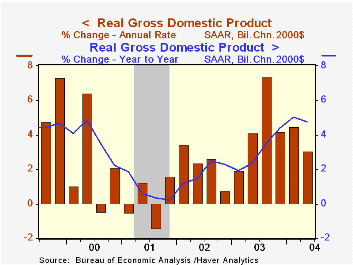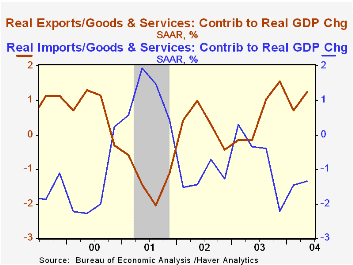 Global| Jul 30 2004
Global| Jul 30 20042Q GDP Growth Slowed, Inflation Up
by:Tom Moeller
|in:Economy in Brief
Summary
US real GDP growth in 2Q slowed sharply to 3.0% from the upwardly revised estimate of 4.5% growth 1Q. Consensus estimates had been for 3.7% growth last quarter. Figures back to 1Q 2001 were revised. Price inflation at 3.2% was [...]

US real GDP growth in 2Q slowed sharply to 3.0% from the upwardly revised estimate of 4.5% growth 1Q. Consensus estimates had been for 3.7% growth last quarter. Figures back to 1Q 2001 were revised.
Price inflation at 3.2% was slightly higher than expectations for a 3.0% gain. The PCE chain price index, up 3.3%, rose the same as in 1Q but investment price inflation rose. Business equipment & software prices rose 0.2% (0.1% y/y) versus the 1.1% 1Q decline. Residential investment prices also picked up to 7.0% (5.3% y/y).Less food & energy the GDP chain price index rose 2.6% (1.9% y/y) after a 2.3% rise in 1Q.
Growth in total domestic final demand slowed to 2.7% from 3.9% in 1Q. Sharply slower growth in consumer spending was the culprit behind the 2Q growth slowdown. Real PCE grew at just a 1.0% rate versus 4.1% 1Q growth. Spending on motor vehicles & parts fell (for the third straight quarter), nondurables goods spending slipped on lower clothing purchases and services spending slowed.
Inventory investment also contributed much less to GDP growth, just a quarter of its contribution in 1Q.
Fixed investment spending actually picked up with the growth in business fixed investment more than doubling versus 1Q to 8.8% (9.9% y/y). Equipment & software spending rose at a 10.0% rate (12.8% y/y) and structures spending rose for the second quarter in the last three. Residential investment growth tripled to 15.4% (12.9% y/y).
The trade sector subtracted a marginal 0.1 percentage points from 2Q GDP growth. The trade sector has been progressively subtracting less from GDP growth versus huge negative contributions from 1997 to 2002 due to accelerated growth in exports. Exports grew at an 18.4% rate (16.2% y/y) last quarter versus 13.4% 1Q growth and declines in 2001 & 2002. Imports grew at a 9.3% rate (9.9% y/y), also more than double the growth of the prior two years.
The Federal Reserve Board's latest Beige Book on US economic activity can be found here.
"What Impact Will E-Commerce Have on the U.S. Economy?" from the Federal Reserve Bank of Kansas City can be found here.
| Chained 2000$, % AR | 2Q '04 (Advance) | 1Q '04 (Revised) | Y/Y | 2003 | 2002 | 2001 |
| GDP | 3.0% | 4.5% | 4.8% | 3.0% | 1.9% | 0.8% |
| Inventory Effect | 0.3% | 1.2% | 0.7% | -0.1% | 0.5% | -0.8% |
| Final Sales | 2.8% | 3.3% | 4.1% | 3.1% | 1.4% | 1.6% |
| Trade Effect | -0.1% | -0.8% | -0.1% | -0.3% | -0.7% | -0.2% |
| Domestic Final Demand | 2.7% | 3.9% | 4.2% | 3.4% | 2.1% | 1.8% |
| Chained GDP Price Index | 3.2% | 2.8% | 2.3% | 1.8% | 1.7% | 2.4% |
| Chained 2000$, % AR | 2Q '04 (Advance) |
1Q '04 (Revised) |
Y/Y | 2003 | 2002 | 2001 |
|---|---|---|---|---|---|---|
| GDP | 3.0% | 4.5% | 4.8% | 3.0% | 1.9% | 0.8% |
| Inventory Effect | 0.3% | 1.2% | 0.7% | -0.1% | 0.5% | -0.8% |
| Final Sales | 2.8% | 3.3% | 4.1% | 3.1% | 1.4% | 1.6% |
| Trade Effect | -0.1% | -0.8% | -0.1% | -0.3% | -0.7% | -0.2% |
| Domestic Final Demand | 2.7% | 3.9% | 4.2% | 3.4% | 2.1% | 1.8% |
| Chained GDP Price Index | 3.2% | 2.8% | 2.3% | 1.8% | 1.7% | 2.4% |
Tom Moeller
AuthorMore in Author Profile »Prior to joining Haver Analytics in 2000, Mr. Moeller worked as the Economist at Chancellor Capital Management from 1985 to 1999. There, he developed comprehensive economic forecasts and interpreted economic data for equity and fixed income portfolio managers. Also at Chancellor, Mr. Moeller worked as an equity analyst and was responsible for researching and rating companies in the economically sensitive automobile and housing industries for investment in Chancellor’s equity portfolio. Prior to joining Chancellor, Mr. Moeller was an Economist at Citibank from 1979 to 1984. He also analyzed pricing behavior in the metals industry for the Council on Wage and Price Stability in Washington, D.C. In 1999, Mr. Moeller received the award for most accurate forecast from the Forecasters' Club of New York. From 1990 to 1992 he was President of the New York Association for Business Economists. Mr. Moeller earned an M.B.A. in Finance from Fordham University, where he graduated in 1987. He holds a Bachelor of Arts in Economics from George Washington University.
More Economy in Brief
 Global| Feb 05 2026
Global| Feb 05 2026Charts of the Week: Balanced Policy, Resilient Data and AI Narratives
by:Andrew Cates






